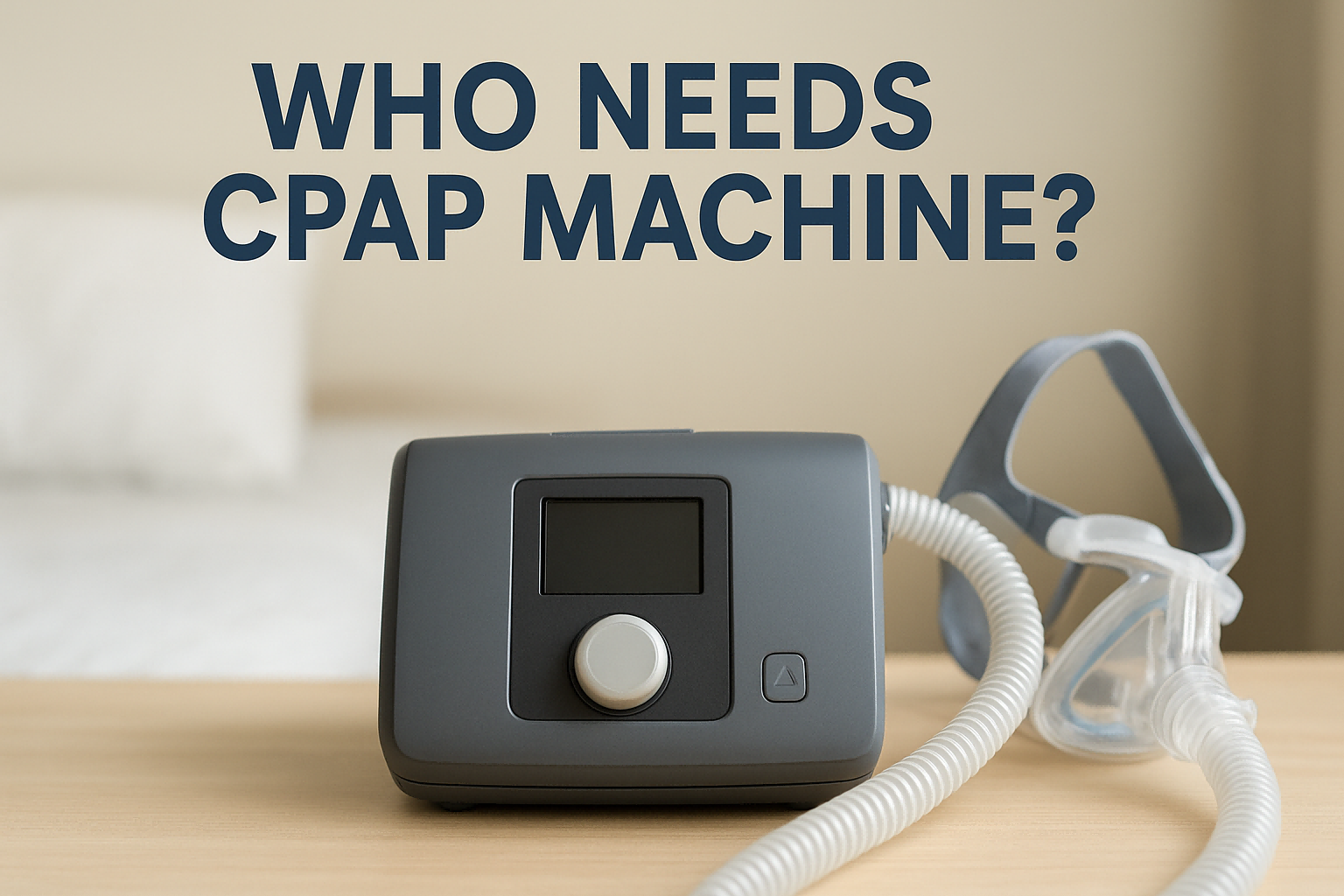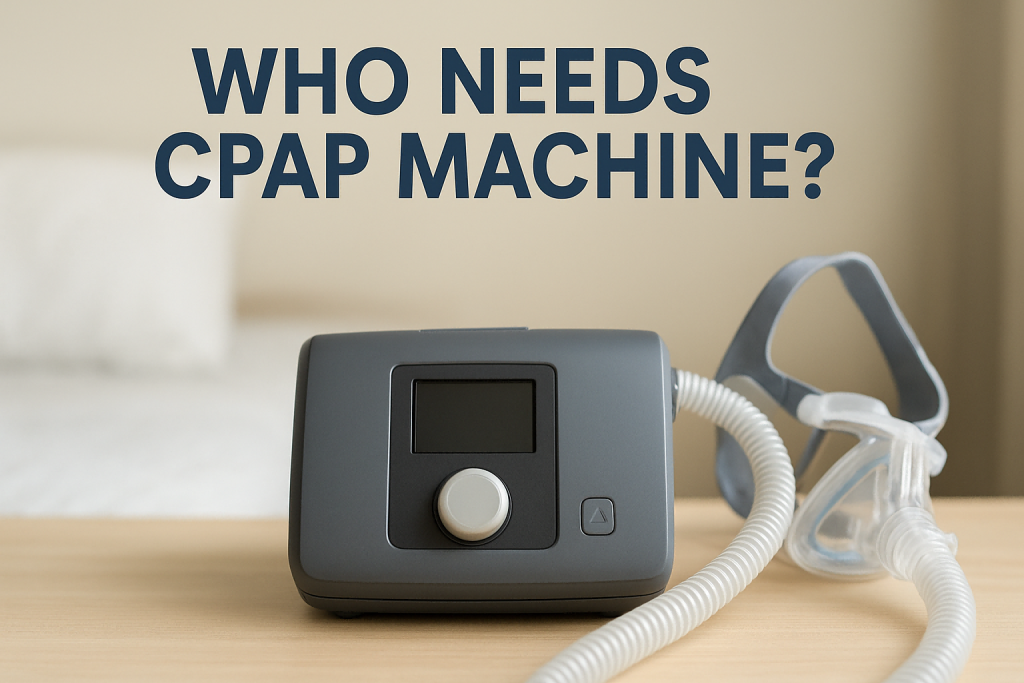Who Needs CPAP Machine? The Complete Guide for Better Sleep and Health


Introduction: Understanding CPAP Therapy
A CPAP machine (Continuous Positive Airway Pressure machine) has become a lifeline for millions of people struggling with poor sleep, loud snoring, and dangerous breathing interruptions. But who needs CPAP machine therapy exactly? It’s not just for those with loud snoring—it’s for individuals whose health and quality of life are at risk because of sleep-related breathing disorders.
In this guide, we’ll break down the signs, symptoms, risk factors, and medical conditions that indicate you may need CPAP therapy. You’ll also learn the benefits, common challenges, and expert tips for getting the most out of CPAP treatment.
What Is a CPAP Machine and How Does It Work?
A CPAP machine is a medical device designed to help people with sleep-related breathing problems. It works by sending a steady stream of pressurized air through a mask, keeping the airway open during sleep.
Key Components of a CPAP Machine
- Motor and Airflow Generator – Creates a continuous stream of pressurized air.
- Tubing – Connects the machine to the mask.
- Mask (Nasal, Full-Face, or Nasal Pillow) – Delivers air directly to the user’s airway.
- Humidifier (optional) – Adds moisture to reduce dryness in the nose and throat.
How CPAP Delivers Continuous Positive Airway Pressure
When you fall asleep, throat muscles naturally relax. For some people, this causes the airway to collapse, leading to obstructive sleep apnea (OSA). A CPAP machine prevents this collapse by maintaining constant air pressure, ensuring steady breathing and oxygen flow throughout the night.
Who Needs CPAP Machine: Primary Candidates
The question “Who needs CPAP machine therapy?” is best answered by looking at medical conditions that directly benefit from CPAP.
People with Obstructive Sleep Apnea (OSA)
The most common group who need CPAP machines are those diagnosed with OSA. This condition causes repeated pauses in breathing during sleep, sometimes hundreds of times per night. Without CPAP, oxygen levels drop, straining the heart and brain.
Patients with Central Sleep Apnea (CSA)
Unlike OSA, CSA occurs when the brain fails to send proper signals to the muscles that control breathing. CPAP or a variation like BiPAP (Bilevel Positive Airway Pressure) can help stabilize breathing patterns.
Individuals with Mixed or Complex Sleep Apnea
Some patients experience a combination of both OSA and CSA. In these cases, CPAP machines are often prescribed as the first line of treatment.
People with Chronic Snoring and Breathing Interruptions
Loud snoring isn’t always harmless. If snoring is paired with choking, gasping, or daytime sleepiness, CPAP may be recommended—even without a full diagnosis of apnea.
Signs and Symptoms That Indicate You May Need a CPAP Machine
It’s not always obvious who needs CPAP machine therapy, because symptoms can be subtle or mistaken for other health problems. However, there are common warning signs to watch out for.
Loud and Persistent Snoring
Snoring is one of the earliest red flags of sleep apnea. While not everyone who snores needs CPAP, consistent and loud snoring often signals airway obstruction. If snoring is paired with pauses in breathing, CPAP therapy is strongly recommended.
Excessive Daytime Sleepiness
People with untreated sleep apnea often wake up feeling unrefreshed, no matter how many hours they’ve slept. This leads to drowsiness at work, poor concentration, and even dangerous driving fatigue.
Morning Headaches and Dry Mouth
A dry throat, headaches, or a parched mouth upon waking can indicate poor oxygen supply during the night. CPAP use ensures continuous airflow, preventing oxygen dips that cause these issues.
Witnessed Breathing Pauses During Sleep
Many patients are unaware of their own breathing pauses until a partner notices them gasping or choking while asleep. These episodes are hallmark signs that someone needs CPAP intervention.
Risk Factors That Increase the Need for CPAP Therapy
Not everyone develops sleep apnea, but certain risk factors increase the likelihood of needing CPAP therapy.
Obesity and Excess Weight
Extra fat around the neck and throat narrows the airway, increasing the chance of obstruction during sleep. In fact, obesity is the strongest predictor of OSA.
Age and Gender Influences
Men over 40 have a higher risk of sleep apnea, although women—especially after menopause—are also vulnerable. Risk increases with age due to muscle relaxation in the airway.
Family History and Genetics
If sleep apnea runs in your family, you may inherit physical traits such as a narrow throat, enlarged tonsils, or a small jaw that predispose you to airway collapse.
Lifestyle Factors (Alcohol, Smoking, Sedentary Habits)
- Alcohol relaxes throat muscles, worsening apnea episodes.
- Smoking inflames the airway, making breathing harder at night.
- Lack of exercise contributes to weight gain, another risk factor for CPAP need.
Health Conditions That Benefit from CPAP Therapy
A CPAP machine doesn’t just improve sleep—it protects overall health by reducing strain on the heart, brain, and metabolism.
Hypertension and Heart Disease
Sleep apnea raises blood pressure and increases the risk of heart attack, arrhythmia, and heart failure. Using a CPAP machine has been shown to lower nighttime blood pressure and improve cardiovascular outcomes.
Type 2 Diabetes and Insulin Resistance
Poor sleep worsens blood sugar control. CPAP therapy helps stabilize oxygen levels, which in turn improves insulin sensitivity.
Stroke and Cognitive Decline Prevention
Interrupted oxygen flow at night can damage brain cells, raising the risk of stroke, memory loss, and even dementia. CPAP helps protect brain function by restoring normal oxygen supply.
Chronic Fatigue Syndrome and Depression
Lack of restorative sleep contributes to mood disorders and chronic fatigue. Patients often report feeling more energized and emotionally stable after consistent CPAP use.
Who May Not Need a CPAP Machine?
While CPAP therapy is a gold standard, it’s not necessary for everyone.
People with Mild Sleep Apnea
Some individuals with very mild cases may benefit more from lifestyle changes before moving to CPAP.
Patients Who Respond to Lifestyle Changes
Weight loss, exercise, quitting smoking, and reducing alcohol often improve breathing and reduce apnea severity.
Alternatives: Oral Appliances, Surgery, and Positional Therapy
- Oral appliances reposition the jaw to keep airways open.
- Surgery may be considered if enlarged tonsils or nasal blockages are the cause.
- Positional therapy works for people whose apnea worsens when sleeping on their back.
Benefits of Using a CPAP Machine
Understanding the benefits helps patients stay motivated to use CPAP therapy consistently.
Improved Sleep Quality
Deep, uninterrupted sleep restores energy, improves mood, and enhances daily performance.
Reduced Risk of Cardiovascular Issues
Consistent CPAP use lowers blood pressure and protects the heart from strain caused by repeated oxygen drops.
Enhanced Mental Health and Focus
Better sleep sharpens memory, focus, and overall cognitive performance.
Longer Life Expectancy
By preventing strokes, heart attacks, and other complications, CPAP can literally add years to one’s life.
Common Challenges and Side Effects of CPAP Machines
Although life-changing, CPAP therapy does have its challenges.
Mask Discomfort and Skin Irritation
Poorly fitted masks can cause pressure sores, skin irritation, or air leaks. Choosing the right mask type is essential.
Dry Nose and Throat
Airflow can dry out nasal passages, but a built-in humidifier often solves this issue.
Claustrophobia and Adjustment Issues
Some patients feel trapped by the mask at first. Gradual acclimation, starting with short sessions, can help.
Noise and Travel Inconvenience
Modern CPAP machines are much quieter and more portable, but traveling with one still requires planning.
Tips for Successful CPAP Therapy
Long-term success with CPAP depends on comfort and consistency.
Choosing the Right Mask and Fit
Different mask styles (nasal pillow, nasal mask, full-face) suit different breathing patterns and comfort levels.
Cleaning and Maintenance Best Practices
Daily mask cleaning and weekly tubing/water chamber cleaning prevent bacteria buildup and extend machine life.
Adjusting Pressure Settings with Doctor Guidance
Never self-adjust your CPAP pressure without medical advice—your doctor tailors settings to your condition.
Building a Consistent Sleep Routine
Using CPAP every night, even during naps, ensures maximum benefits.
Real-Life Experiences: Who Needs CPAP Machine and How It Changed Their Life
Patient Success Stories
Many patients report feeling like a “new person” after just weeks of CPAP use. Energy levels rise, mood improves, and chronic health issues stabilize.
Sleep Specialist Insights
Doctors emphasize that CPAP is not just about sleep—it’s about preventing long-term health complications.
FAQs About Who Needs CPAP Machine
Q1: How do I know if I need a CPAP machine?
A sleep study is the gold standard for diagnosis. Symptoms like snoring, fatigue, and witnessed apnea events are also indicators.
Q2: Can I use a CPAP without a prescription?
No. CPAP machines require a prescription after a proper sleep evaluation.
Q3: Is CPAP therapy permanent?
In many cases, yes—but weight loss, surgery, or other treatments may reduce or eliminate the need.
Q4: What happens if I don’t use my CPAP machine?
Untreated apnea raises the risk of heart disease, stroke, diabetes, and shortened lifespan.
Q5: Are there alternatives to CPAP?
Yes—oral appliances, positional therapy, and surgery may help certain patients.
Q6: How long does it take to feel the benefits of CPAP?
Some patients notice improvement in just a few nights, while others may take weeks.
Conclusion: The Lifesaving Role of CPAP Machines
So, who needs CPAP machine therapy? Anyone diagnosed with sleep apnea—or showing strong symptoms like loud snoring, daytime sleepiness, or breathing interruptions—should speak with a sleep specialist. CPAP therapy doesn’t just improve rest—it protects the heart, brain, and body from long-term harm.
If you or a loved one struggles with sleep apnea, don’t ignore it. A CPAP machine could be the tool that restores restful nights, sharpens focus, and extends life expectancy.
🔗 Learn more from the American Sleep Apnea Association for professional resources.
















